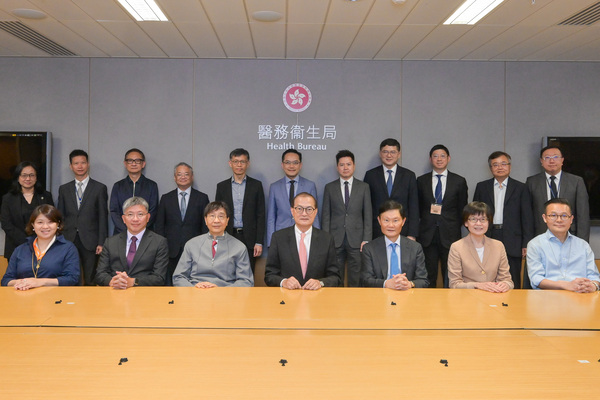Antimicrobial resistance work studied

Secretary for Health Prof Lo Chung-mau (front row, centre) convenes the ninth meeting of the High Level Steering Committee on Antimicrobial Resistance.
Secretary for Health Prof Lo Chung-mau today convened the ninth meeting of the High Level Steering Committee on Antimicrobial Resistance (AMR).
The meeting was held to review the implementation of the Hong Kong Strategy & Action Plan on Antimicrobial Resistance (2023-2027) and discuss strategies with relevant government departments and organisations.
Prof Lo highlighted that AMR is considered one of the greatest threats to global health and economic stability, adding that the Government has long attached great importance to the necessity of tackling it.
“As inter-sectoral collaboration and communication across the community are crucial to mitigating such a threat, the Government has been rallying cross-sectoral co-ordination and co-operation of relevant government departments, as well as organisations under the ‘One Health’ framework, to implement various aspects of the Action Plan over the past few years,” he explained.
The Health Bureau reported that a series of actions were being taken based on the action plan.
These include considering legislative amendments to mandate the recording of antimicrobial prescriptions, using information technology to strengthen antibiotic stewardship in public hospitals, enhancing surveillance and dissemination of AMR data in ready-to-eat food, and implementing the “veterinary prescription-only medication supply” policy in animal farms locally.
At today’s meeting, the steering committee reviewed the progress of the actions taken to date and evaluated the local AMR situation with reference to relevant surveillance data.
The data showed that the wholesale supply of antimicrobials to community pharmacies dropped steadily from 18.5% in 2016 to 4.1% last year.
Moreover, considering the total antimicrobial supply in Hong Kong, the proportion of those less likely to result in resistance – as defined under the World Health Organization’s (WHO) “Access” classification, reached 60.2% last year, achieving the target set by the WHO.
The Hospital Authority also closely monitors antibiotic consumption trends and AMR patterns. According to its data, use of Methicillin-resistant Staphylococcus aureus fell by 3.0 percentage points last year, compared with 2022, while use of Carbapenem-resistant Acinetobacter fell 8.9 percentage points.
Meanwhile, the Food & Environmental Hygiene Department’s Centre for Food Safety issued a reminder to the food trade and the public that raw or undercooked food is high-risk as it may carry bacteria with AMR. High-risk individuals should avoid consuming such food whenever possible.
The Government called on different sectors to continue working closely together to cope with the challenges brought about by AMR.
Healthcare professionals should follow established guidelines on the prudent use of antimicrobials, while patients should strictly adhere to doctors' instructions when taking antimicrobials and should not buy antimicrobials on their own at community pharmacies without a prescription.